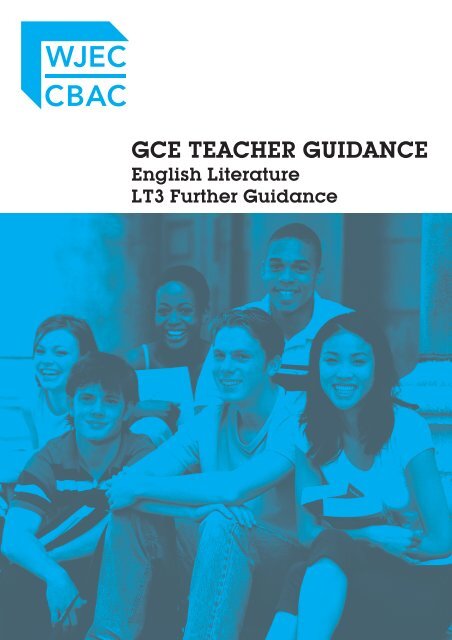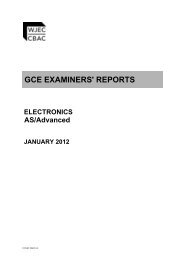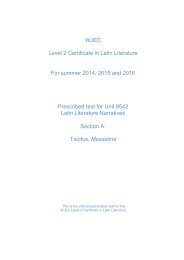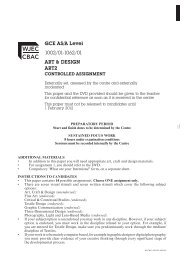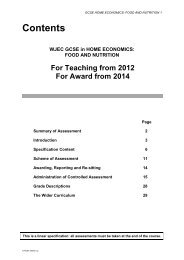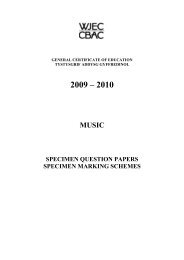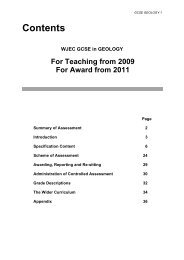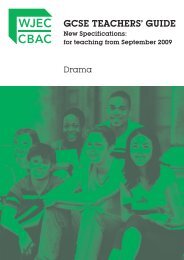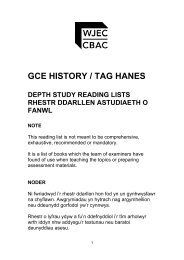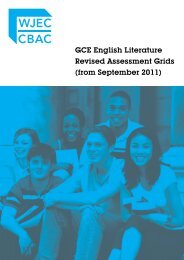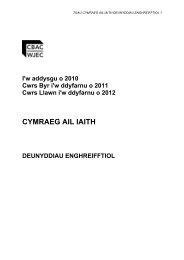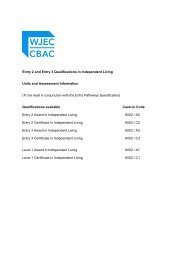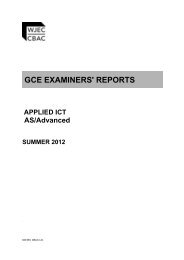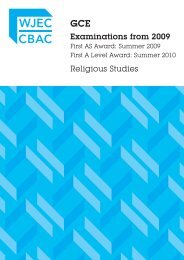LT3: Period and Genre Study - WJEC
LT3: Period and Genre Study - WJEC
LT3: Period and Genre Study - WJEC
Create successful ePaper yourself
Turn your PDF publications into a flip-book with our unique Google optimized e-Paper software.
GCE TEACHER GUIDANCE<br />
English Literature<br />
<strong>LT3</strong> Further Guidance
<strong>LT3</strong><br />
Notes on Text Selection<br />
In a specification where freedom <strong>and</strong> independent reading are encouraged there are<br />
bound to be questions from time to time about the suitability of texts for A level study.<br />
The <strong>WJEC</strong> has a statutory responsibility to ensure that texts studied are of sufficient<br />
weight <strong>and</strong> merit to warrant attention for examination purposes at A level <strong>and</strong>, in the<br />
rare cases where there are grounds for doubt, the <strong>WJEC</strong> will ask centres to choose a<br />
different, more appropriate text.<br />
In the vast majority of cases, colleagues’ professional judgements will be sufficient to<br />
advise c<strong>and</strong>idates on suitable texts for a well-balanced A level course offering stretch<br />
<strong>and</strong> challenge. However, new <strong>and</strong> untested texts are becoming available all the time<br />
<strong>and</strong> before proposing a text for coursework, teachers should apply the following<br />
broad principles to their choice to check that it will give sufficient opportunities for<br />
c<strong>and</strong>idates to demonstrate their literary knowledge <strong>and</strong> underst<strong>and</strong>ing.<br />
Length<br />
Does the text (as a whole if short stories or poetry anthologies are under<br />
consideration) provide the opportunity for sustained reading?<br />
Literary Qualities<br />
Would the c<strong>and</strong>idate be able to address the following in a complex way?<br />
• Context<br />
• Narrative voice<br />
• Characterisation<br />
• Plot structure<br />
• Thematic dimensions<br />
• Language <strong>and</strong> tone<br />
While a novel, set of stories or collection of poetry might provide entertainment of a<br />
compelling but superficial kind (e.g. Spike Milligan’s hilarious verse; Frederick<br />
Forsythe’s action thrillers or romantic fiction designed for the popular magazine<br />
market), A Level English Literature c<strong>and</strong>idates will struggle to write in sufficient depth<br />
if they cannot engage purposefully with elements from the list above. If a text fails to<br />
offer sufficient challenge, it automatically restricts the possible range of tasks <strong>and</strong><br />
responses <strong>and</strong> therefore does not serve the c<strong>and</strong>idate’s best interests.<br />
As part of their reports to centres, moderators will indicate if they have found a<br />
text to be of insufficient merit or complexity to be suitable for A level<br />
c<strong>and</strong>idates <strong>and</strong> will advise that the text should not be selected in the future. It<br />
is then likely that the centre will be asked by <strong>WJEC</strong> to remove that text from<br />
their list of choices. Where there is disagreement, the final decision will rest<br />
with the Subject Secretary in consultation with the relevant Principal<br />
Moderator.
<strong>LT3</strong> Task –Building<br />
Stage 1 (When reading of all 3 texts is well underway or complete)<br />
Encourage the c<strong>and</strong>idate to identify his/her particular interest in an element which<br />
links all texts.<br />
Example<br />
“Marriage” is chosen<br />
C<strong>and</strong>idate proposes:<br />
“Why is marriage important in the three texts?”<br />
A very awkward <strong>and</strong> limited question which does not provide sufficient support or<br />
appropriate focus……<br />
BUT<br />
Stage 2<br />
C<strong>and</strong>idate is reminded of the need to address the important Cs:<br />
Creativity (AO1)<br />
Close analysis of core texts (AO2)<br />
Connections <strong>and</strong> Comparison (AO3)<br />
Consideration of other views /critical readings (AO3)<br />
Contexts (AO4)<br />
C<strong>and</strong>idate suggests:<br />
“Compare the marriages in the texts you have studied.”<br />
This wording implies that the marriages are real <strong>and</strong> could easily encourage a<br />
superficial, narrative approach.<br />
Further discussion takes better account of the “Cs” above <strong>and</strong> produces a title which<br />
points to some of the key approaches the student will need to take:<br />
“Compare the ways writers of different periods have presented the problems<br />
of marriage.”<br />
We could improve upon this because there is no hint at the need for different<br />
approaches to core <strong>and</strong> partner texts <strong>and</strong> the idea of different periods is so clearly<br />
embedded in the core text choices that it does not need to appear explicitly in the<br />
title. (However, this aspect of the AO needs to be carefully monitored as the student<br />
writes a first draft.) We can dispense with “problems” as it imposes unnecessary<br />
restrictions.
Further discussion produces the following:<br />
Stage 3<br />
Explore the presentation of marriage in The Merchant’s Tale <strong>and</strong> Pride <strong>and</strong><br />
Prejudice. In the course of your writing show how your ideas have been<br />
illuminated by your response to The Country Wife <strong>and</strong> other readings of both<br />
core texts.<br />
“Explore + presentation” points to the need for close analysis of the core texts.<br />
Consideration of the different contexts is implicit in the choice of texts from such<br />
clearly different periods.<br />
“In the course of your writing” implies that attention to The Country Wife is not the<br />
primary concern.<br />
“illuminated” hints at the ways both partner text <strong>and</strong> other readings need to be used.<br />
We now have a final title which a student should find supportive <strong>and</strong> enabling <strong>and</strong><br />
there is still plenty of opportunity for an independent creative approach to the<br />
material. The c<strong>and</strong>idate’s first suggestion has been radically changed but it’s<br />
important to see the development of good tasks as a key element of the teaching<br />
process rather than a curtailment of students’ freedom of expression.<br />
Please note that there are various ways in which to address the assessment<br />
objectives; this is only one example. We would encourage independence in tasksetting<br />
<strong>and</strong> as much student-teacher negotiation as is practicable.
The following extract from a trialled<br />
<strong>LT3</strong> Balancing Acts<br />
Core Poetry Text: The Merchant’s Tale (Chaucer)<br />
Core Prose Text: Pride <strong>and</strong> Prejudice (Austen)<br />
Partner Text (Drama): The Country Wife (Wycherley)<br />
Task focus: Marriage<br />
………………………………………………………………….The view expressed by<br />
January that “wedlock is so esy <strong>and</strong> so clene” <strong>and</strong> later that “A Wyf is goddes yifte<br />
verraily” does not hold true for him <strong>and</strong> it would be difficult to see how the longsuffering<br />
Mr Bennet or the besieged Pinchwife would be able to agree. If we take<br />
January’s naïve idealism in the early part of The Merchant’s Tale to be typical of<br />
human hopes <strong>and</strong> expectations in any age, we can measure the ways Chaucer,<br />
Austen <strong>and</strong> Wycherley show in their own distinct societies how flawed human nature<br />
inevitably frustrates those hopes <strong>and</strong> expectations. It soon becomes apparent that in<br />
medieval Pavia the marriage between an old man <strong>and</strong> a young woman is primarily a<br />
means for the man of securing a nurse, a legal sexual partner <strong>and</strong> a mother for his<br />
heirs. In Regency Engl<strong>and</strong>, however, marriage becomes the key means for a man or<br />
woman to achieve security <strong>and</strong> possibly social advancement. As an emblem of all the<br />
debauchery <strong>and</strong> recklessness of Restoration Engl<strong>and</strong>, Horner sees marriage as an<br />
obstacle which must be overcome if his career as a seducer is to prosper.<br />
Both The Merchant’s Tale <strong>and</strong> Pride <strong>and</strong> Prejudice begin with unambiguous<br />
declarations of the central theme of marriage. By line four of Chaucer’s tale we learn<br />
that the old Knight, January is “a wyflees man” <strong>and</strong> within a few lines we are told that<br />
he has “a greet corage……….to been a wedded man.” However, we have already<br />
been given a clue that the enthusiasm expressed in “greet corage” might be<br />
prompted by the need to make amends for his promiscuous sexual behaviour to date<br />
which has been immoral <strong>and</strong> sinful by the lights of a medieval society governed as<br />
much by religious as secular law. A wife will be the means for this elderly <strong>and</strong> sinful<br />
man to put his moral house in order before facing the judgement of his maker. In an<br />
apparently contrasting way, the subject of marriage launched at the start of Pride <strong>and</strong><br />
Prejudice is closely linked to the notion of material wealth. In Jane Austen’s world it is<br />
“universally acknowledged” that once a man’s finances are secure the next thing he<br />
needs (claims the teasing <strong>and</strong> ironic narrator) is a wife. While the contrasts between<br />
an earthy <strong>and</strong> sexually uninhibited society such as Chaucer’s <strong>and</strong> the restrained<br />
propriety of Jane Austen’s are immediately apparent, we might find that the writers’<br />
attitudes towards marriage as a means to an end rather than an end in itself are<br />
closer than might be anticipated.<br />
Biting satirical comedy, which is to be found in both texts as men <strong>and</strong> women fall so<br />
far short of ideal models of behaviour, occurs in a more intense form in the moral<br />
chaos of Restoration London: Horner publicly proclaims his “impotence” so as to gain<br />
intimate access to married women who have no affection for their husb<strong>and</strong>s <strong>and</strong> are<br />
concerned only for their material wealth or reputations rather than their actual moral<br />
probity.
Far from being the blissful state anticipated by Chaucer’s old knight (“to take a wyf it<br />
is a glorious thing,”) in all three texts marriage is seen as a potential means of<br />
punishment <strong>and</strong> suffering for the unwary or the unwise. Mr Bennet <strong>and</strong> old January<br />
are condemned to lives with unsuitable partners <strong>and</strong> in all three texts in the likes of<br />
Wickham, Damian <strong>and</strong> Horner there are the irresistible forces of illicit passion<br />
designed to undermine the fabric <strong>and</strong> conventions of marriage………………………….<br />
…………………………… .<br />
(583 words) About 20% of the length of final essay<br />
• How successful would the essay be (in terms of its approach to the task<br />
<strong>and</strong> texts) if it continued in this way – i.e. maintaining similar<br />
proportions of attention to texts over the remaining 80% of its contents?<br />
• What improvements would you recommend to the piece as it st<strong>and</strong>s?<br />
• Summary of strengths <strong>and</strong> weaknesses?<br />
Task focus: Deception<br />
…………………………………………………………..While an elderly but wealthy<br />
medieval man might not have been deceiving himself in planning to marry a young<br />
woman in need of security, January is guilty of the most absurd self-deception when<br />
he imagines that such a woman might be physically attracted to him <strong>and</strong> his courting<br />
rituals. Chaucer further explores the theme of deceit in showing that January’s<br />
ridiculous view of himself is supported by the flatterers in his court who counsel that<br />
he should please himself when it comes to marriage <strong>and</strong> satisfy his taste for “tender<br />
veel” in preference to “old boef.” However, in resorting to an extraordinary number of<br />
reputed aphrodisiacs in order to prepare himself for the dem<strong>and</strong>s of his wedding<br />
night, January’s arrogant swaggering is punctured <strong>and</strong> the truth about his insecurities<br />
revealed. The old knight’s physical shortcomings are at once comic, pathetic <strong>and</strong><br />
repellent with a beard “sharpe as brere” <strong>and</strong> “The slake skyn aboute his nekke<br />
shaketh” so that it is little surprise that the “fresshe May” has been “brought abedde<br />
as stille as stoon” <strong>and</strong> takes the first opportunity to deceive January with his youthful<br />
Squire, Damian.<br />
If self-deceiving old men with appetites that far oustripped their powers were figures<br />
of fun <strong>and</strong> derision for Chaucer’s audience, Jane Austen’s readers (in a far more<br />
socially restrained age of formality <strong>and</strong> politeness) might have found their<br />
entertainment <strong>and</strong> moral exemplars in the likes of Mr Collins <strong>and</strong> his belief in himself<br />
as the ideal husb<strong>and</strong>: firstly for the spirited Elizabeth Bennett <strong>and</strong> then the more<br />
acquiescent Charlotte. In Mr Collins, Jane Austen paints a picture of absurd<br />
snobbery, overbearing egotism <strong>and</strong> obnoxious diffidence: his shock at the idea of<br />
reading a novel to the ladies <strong>and</strong> offering a sermon instead tells Austen’s<br />
contemporaries <strong>and</strong> a modern readership almost as much as they need to know<br />
about Collins’s blindness to his own inadequacies. Austen shows his comic<br />
priggishness becoming ever more sinister as he presses his unwelcome attentions<br />
upon a protesting Elizabeth <strong>and</strong> deceives himself into thinking that he is a victim of<br />
her tactical rejection:
“I must therefore conclude that you are not serious in your rejection of me, I shall<br />
choose to attribute it to your wish of increasing my love by suspense, according to<br />
the usual practice of elegant females.”<br />
Strategic deception of others however, as well as self-deception, is a key component<br />
of all three texts <strong>and</strong> employed for a variety of purposes. Nothing could be more<br />
outrageous than May’s behaviour in the final stages of The Merchant’s Tale as,<br />
tearfully, she assures her blind husb<strong>and</strong> of her loyalty while signalling to her lover to<br />
wait for her in the pear tree. In making her deception so complete <strong>and</strong> the<br />
consummation of her betrayal so brutal, Chaucer creates a perfect vehicle for<br />
satirizing the pretensions of the cult of courtly love which, if taken to its logical<br />
conclusion, seems more to do with sordid adultery than elegance or gentility.<br />
Similarly, the rampant sexuality of Mrs Pinchwife <strong>and</strong> her determination to deceive<br />
her lumpish husb<strong>and</strong> provides Wycherley with the perfect emblem of a morally<br />
bankrupt age where the comic absurdity <strong>and</strong> immorality of human behaviour is<br />
shared even-h<strong>and</strong>edly between men <strong>and</strong> women. January <strong>and</strong> Pinchwife marry their<br />
young wives with selfish <strong>and</strong> lascivious motives; the women respond with dishonesty<br />
<strong>and</strong> betrayal…………………………………………………<br />
(552 words) About 20% of the length of final essay<br />
• How successful would the essay be (in terms of its approach to the task<br />
<strong>and</strong> texts) if it continued in this way – ie maintaining similar proportions<br />
of attention to texts over the remaining 80% of its contents?<br />
• What improvements would you recommend to the piece as it st<strong>and</strong>s?<br />
• Summary of strengths <strong>and</strong> weaknesses?
<strong>LT3</strong>: Tracking AOs<br />
AO1 Articulate creative, informed <strong>and</strong> relevant responses to literary texts using<br />
appropriate terminology <strong>and</strong> concepts <strong>and</strong> coherent, accurate written expression.<br />
AO2 Demonstrate detailed critical underst<strong>and</strong>ing in analyzing the ways in which<br />
structure, form <strong>and</strong> language shape meaning in literary texts.<br />
AO3 Explore connections <strong>and</strong> comparisons between different literary texts informed<br />
by interpretations of other readers.<br />
AO4 Demonstrate underst<strong>and</strong>ing of the significance <strong>and</strong> influence of the contexts in<br />
which literary texts are written <strong>and</strong> received.<br />
Task focus: Marriage<br />
………………………………………………………………….The view expressed by<br />
January that “wedlock is so esy <strong>and</strong> so clene” <strong>and</strong> later that “A Wyf is goddes yifte<br />
verraily” does not hold true for him <strong>and</strong> it would be difficult to see how the longsuffering<br />
Mr Bennet or the besieged Pinchwife would be able to agree. If we take<br />
January’s naïve idealism in the early part of The Merchant’s Tale to be typical of<br />
human hopes <strong>and</strong> expectations in any age, we can measure the ways Chaucer,<br />
Austen <strong>and</strong> Wycherley show in their own distinct societies how flawed human nature<br />
inevitably frustrates those hopes <strong>and</strong> expectations. It soon becomes apparent that in<br />
medieval Pavia the marriage between an old man <strong>and</strong> a young woman is primarily a<br />
means for the man of securing a nurse, a legal sexual partner <strong>and</strong> a mother for his<br />
heirs. In Regency Engl<strong>and</strong>, however, marriage becomes the key means for a man or<br />
woman to achieve security <strong>and</strong> possibly social advancement. As an emblem of all the<br />
debauchery <strong>and</strong> recklessness of Restoration Engl<strong>and</strong>, Horner sees marriage as an<br />
obstacle which must be overcome if his career as a seducer is to prosper.<br />
Both The Merchant’s Tale <strong>and</strong> Pride <strong>and</strong> Prejudice begin with unambiguous<br />
declarations of the central theme of marriage. By line four of Chaucer’s tale we learn<br />
that the old Knight, January is “a wyflees man” <strong>and</strong> within a few lines we are told that<br />
he has “a greet corage……….to been a wedded man.” However, we have already<br />
been given a clue that the enthusiasm expressed in “greet corage” might be<br />
prompted by the need to make amends for his promiscuous sexual behaviour to date<br />
which has been immoral <strong>and</strong> sinful by the lights of a medieval society governed as<br />
much by religious as secular law. A wife will be the means for this elderly <strong>and</strong> sinful<br />
man to put his moral house in order before facing the judgement of his maker. In an<br />
apparently contrasting way, the subject of marriage launched at the start of Pride <strong>and</strong><br />
Prejudice is closely linked to the notion of material wealth. In Jane Austen’s world it is<br />
“universally acknowledged” that once a man’s finances are secure the next thing he<br />
needs (claims the teasing <strong>and</strong> ironic narrator) is a wife. While the contrasts between<br />
an earthy <strong>and</strong> sexually uninhibited society such as Chaucer’s <strong>and</strong> the restrained<br />
propriety of Jane Austen’s are immediately apparent, we might find that the writers’<br />
attitudes towards marriage as a means to an end rather than an end in itself are<br />
closer than might be anticipated.
Biting satirical comedy, which is to be found in both texts as men <strong>and</strong> women fall so<br />
far short of ideal models of behaviour, occurs in a more intense form in the moral<br />
chaos of Restoration London: Horner publicly proclaims his “impotence” so as to gain<br />
intimate access to married women who have no affection for their husb<strong>and</strong>s <strong>and</strong> are<br />
concerned only for their material wealth or reputations rather than their actual moral<br />
probity.<br />
Far from being the blissful state anticipated by Chaucer’s old knight (“to take a wyf it<br />
is a glorious thing,”) in all three texts marriage is seen as a potential means of<br />
punishment <strong>and</strong> suffering for the unwary or the unwise. Mr Bennet <strong>and</strong> old January<br />
are condemned to lives with unsuitable partners <strong>and</strong> in all three texts in the likes of<br />
Wickham, Damian <strong>and</strong> Horner there are the irresistible forces of illicit passion<br />
designed to undermine the fabric <strong>and</strong> conventions of marriage………………………….<br />
…………………………… .<br />
Task focus: Deception<br />
While an elderly but wealthy medieval man might not have been deceiving himself in<br />
planning to marry a young woman in need of security, January is guilty of the most<br />
absurd self-deception when he imagines that such a woman might be physically<br />
attracted to him <strong>and</strong> his courting rituals. Chaucer further explores the theme of deceit<br />
in showing that January’s ridiculous view of himself is supported by the flatterers in<br />
his court who counsel that he should please himself when it comes to marriage <strong>and</strong><br />
satisfy his taste for “tender veel” in preference to “old boef.” However, in resorting to<br />
an extraordinary number of reputed aphrodisiacs in order to prepare himself for the<br />
dem<strong>and</strong>s of his wedding night, January’s arrogant swaggering is punctured <strong>and</strong> the<br />
truth about his insecurities revealed. The old knight’s physical shortcomings are at<br />
once comic, pathetic <strong>and</strong> repellent with a beard “sharpe as brere” <strong>and</strong> “The slake<br />
skyn aboute his nekke shaketh” so that it is little surprise that the “fresshe May” has<br />
been “brought abedde as stille as stoon” <strong>and</strong> takes the first opportunity to deceive<br />
January with his youthful Squire, Damian.<br />
If self-deceiving old men with appetites that far oustripped their powers were figures<br />
of fun <strong>and</strong> derision for Chaucer’s audience, Jane Austen’s readers (in a far more<br />
socially restrained age of formality <strong>and</strong> politeness) might have found their<br />
entertainment <strong>and</strong> moral exemplars in the likes of Mr Collins <strong>and</strong> his belief in himself<br />
as the ideal husb<strong>and</strong>: firstly for the spirited Elizabeth Bennett <strong>and</strong> then the more<br />
acquiescent Charlotte. In Mr Collins, Jane Austen paints a picture of absurd<br />
snobbery, overbearing egotism <strong>and</strong> obnoxious diffidence: his shock at the idea of<br />
reading a novel to the ladies <strong>and</strong> offering a sermon instead tells Austen’s<br />
contemporaries <strong>and</strong> a modern readership almost as much as they need to know<br />
about Collins’s blindness to his own inadequacies. Austen shows his comic<br />
priggishness becoming ever more sinister as he presses his unwelcome attentions<br />
upon a protesting Elizabeth <strong>and</strong> deceives himself into thinking that he is a victim of<br />
her tactical rejection:
“I must therefore conclude that you are not serious in your rejection of me, I shall<br />
choose to attribute it to your wish of increasing my love by suspense, according to<br />
the usual practice of elegant females.”<br />
Strategic deception of others however, as well as self-deception, is a key component<br />
of all three texts <strong>and</strong> employed for a variety of purposes. Nothing could be more<br />
outrageous than May’s behaviour in the final stages of The Merchant’s Tale as,<br />
tearfully, she assures her blind husb<strong>and</strong> of her loyalty while signalling to her lover to<br />
wait for her in the pear tree. In making her deception so complete <strong>and</strong> the<br />
consummation of her betrayal so brutal, Chaucer creates a perfect vehicle for<br />
satirizing the pretensions of the cult of courtly love which, if taken to its logical<br />
conclusion, seems more to do with sordid adultery than elegance or gentility.<br />
Similarly, the rampant sexuality of Mrs Pinchwife <strong>and</strong> her determination to deceive<br />
her lumpish husb<strong>and</strong> provides Wycherley with the perfect emblem of a morally<br />
bankrupt age where the comic absurdity <strong>and</strong> immorality of human behaviour is<br />
shared even-h<strong>and</strong>edly between men <strong>and</strong> women. January <strong>and</strong> Pinchwife marry their<br />
young wives with selfish <strong>and</strong> lascivious motives; the women respond with dishonesty<br />
<strong>and</strong> betrayal…………………………………………………<br />
Activities:<br />
1. Discuss the accuracy of the colour coding. Could some sections be<br />
coloured differently? Are there any places where several colours would<br />
need to be used together to give a fair account of what is happening in<br />
the essay?<br />
2. Comment on the balance of attention given to the different AOs.<br />
3. Is it fair to see AO1 as mostly a “pervasive” or implicit quality of good<br />
writing?<br />
4. As a teacher, what would be your advice to the writers of these extracts<br />
as they prepare to write the final versions of their essays?
A2 ENGLISH LITERATURE <strong>LT3</strong> Assessment Grid<br />
B<strong>and</strong>s<br />
1<br />
2<br />
3<br />
4<br />
Marks<br />
0-10<br />
11-20<br />
21-30<br />
31-40<br />
AO1<br />
Articulate creative, informed<br />
<strong>and</strong> relevant responses to<br />
literary texts, using appropriate<br />
terminology <strong>and</strong> concepts, <strong>and</strong><br />
coherent, accurate written<br />
expression.<br />
Weighting: 5 marks<br />
Response to texts lacks structure,<br />
relevance <strong>and</strong>/or creativity.<br />
Attempts to offer some ideas, with<br />
infrequent terminology. Frequent<br />
errors in expression, particularly<br />
towards bottom of b<strong>and</strong>.<br />
Some evidence of engaging<br />
creatively with texts <strong>and</strong><br />
structuring a response. Some<br />
useful reference to concepts <strong>and</strong><br />
terminology, particularly towards<br />
top of b<strong>and</strong>. Expression features<br />
some inaccuracies, more marked<br />
towards bottom of b<strong>and</strong>.<br />
Makes an informed, creative<br />
response to texts. Increasingly<br />
sound application of key<br />
concepts. Presents a coherent<br />
argument with apt textual<br />
reference <strong>and</strong> terminology.<br />
Written expression generally<br />
accurate <strong>and</strong> clear.<br />
Creative, sophisticated <strong>and</strong><br />
mature response to texts.<br />
Concise use of textual support.<br />
Sophisticated use of concepts<br />
<strong>and</strong> terminology. Writes with flair<br />
<strong>and</strong> accuracy. Very effective<br />
organisation.<br />
AO2<br />
Demonstrate detailed critical<br />
underst<strong>and</strong>ing in analysing the<br />
ways structure, form <strong>and</strong> language<br />
shape meanings in literary texts.<br />
Weighting: 15 marks<br />
Comments on texts at a superficial<br />
level with little underst<strong>and</strong>ing of how<br />
language, form <strong>and</strong> structure create<br />
meaning.<br />
Some awareness of the links<br />
between language/form/structure <strong>and</strong><br />
meaning, but less successful towards<br />
bottom of b<strong>and</strong>.<br />
Some underst<strong>and</strong>ing of sub-text,<br />
more apparent towards top of b<strong>and</strong>.<br />
Purposeful <strong>and</strong> increasingly detailed<br />
discussion of authors’ use of form,<br />
structure <strong>and</strong> language to create<br />
meaning. Neat use of textual support.<br />
Sound grasp of implicit meanings,<br />
particularly towards top of b<strong>and</strong>.<br />
Sophisticated evaluation of the<br />
ways in which writers use <strong>and</strong><br />
adapt language, form <strong>and</strong> structure.<br />
Perceptive critical underst<strong>and</strong>ing of<br />
texts with confident h<strong>and</strong>ling of<br />
implicit meanings.<br />
AO3<br />
Explore connections <strong>and</strong><br />
comparisons between different<br />
literary texts, informed by<br />
interpretations of other readers.<br />
Weighting: 10 marks<br />
Attempts to make superficial<br />
connections between texts. Personal<br />
response not always coherent.<br />
Struggles to engage with other<br />
readings.<br />
Makes some appropriate connections<br />
between texts, with more evidence of<br />
exploration towards top of b<strong>and</strong>.<br />
Predominantly personal response,<br />
particularly towards bottom of b<strong>and</strong>,<br />
with general acknowledgement that<br />
texts may be interpreted in more than<br />
one way.<br />
Sound <strong>and</strong> purposeful<br />
comparisons/connections between<br />
texts. Uses other relevant<br />
interpretations to inform response.<br />
Increasing focus on exploration from<br />
bottom to top of b<strong>and</strong>.<br />
Specific <strong>and</strong> illuminating connections<br />
<strong>and</strong> comparisons between texts.<br />
Mature <strong>and</strong> confident judgements<br />
which absorb other critical opinions.<br />
Autonomous, independent reader<br />
very evident towards top of b<strong>and</strong>.<br />
AO4<br />
Demonstrate underst<strong>and</strong>ing of<br />
the significance <strong>and</strong> influence of<br />
the contexts in which literary<br />
texts are written <strong>and</strong> received.<br />
Weighting: 10 marks<br />
Attempts to make superficial<br />
connections between texts <strong>and</strong><br />
contexts. Struggles to engage with<br />
idea of how contexts influence<br />
texts.<br />
Makes some connections between<br />
texts <strong>and</strong> contexts, more valid<br />
towards top of b<strong>and</strong>.<br />
Basic grasp of the importance of<br />
contextual factors in shaping<br />
literary works, with less clear<br />
underst<strong>and</strong>ing towards the bottom<br />
of the b<strong>and</strong>.<br />
Makes sound <strong>and</strong> purposeful links<br />
between text <strong>and</strong> contexts.<br />
Sensible, increasingly pertinent<br />
discussion of the significance <strong>and</strong><br />
influence of relevant contextual<br />
factors.<br />
Specific <strong>and</strong> illuminating<br />
connections between texts <strong>and</strong><br />
contexts. Perceptive appreciation<br />
of the significance <strong>and</strong> influence of<br />
relevant contexts, with individual<br />
insights most apparent towards top<br />
of b<strong>and</strong>.
Guidance on <strong>WJEC</strong> administration of coursework<br />
The 5 steps<br />
1. Centres are required to assess their students’ work by applying the relevant<br />
assessment grids, which appear in the Teachers’ Guide <strong>and</strong> specification.<br />
2. It is vital that all c<strong>and</strong>idates complete a coversheet <strong>and</strong> that both c<strong>and</strong>idate<br />
<strong>and</strong> teacher sign the coversheet to authenticate the work. According to JCQ<br />
regulations, if a signature is missing, the centre is asked to obtain it, or risk a mark of<br />
zero for that c<strong>and</strong>idate.<br />
3. Where possible, internal moderation should take place, with teachers, or just one<br />
teacher, moderating the work of colleagues by inspecting a sample.<br />
4. Once st<strong>and</strong>ards within the centre have been agreed, a sample of work must be<br />
selected <strong>and</strong> sent to the external moderator. Exams officers will receive moderator<br />
details. In addition to the work, a marksheet must be sent, listing the sampled<br />
c<strong>and</strong>idates only, in rank order. The work must be sent by May 15.<br />
5. A moderator’s report on the work of the centre is sent to the Exams Officer<br />
normally by early September.<br />
For advice on how to select the sample, please consult the online Internal<br />
Assessment Manual:<br />
http://www.wjec.co.uk/uploads/publications/2019.pdf<br />
Note: The moderator may contact the centre to request further samples, so you are<br />
advised to keep the rest of the c<strong>and</strong>idates’ work, (those not sent off as the sample)<br />
complete with coversheets, together in a safe place.<br />
The coversheet <strong>and</strong> marksheet for recording the sample can be downloaded from<br />
the subject area of the website via these links:<br />
Coversheet<br />
Marksheet<br />
C<strong>and</strong>idates must record the word count for their response, <strong>and</strong> include a<br />
bibliography where appropriate.<br />
While <strong>WJEC</strong> does not penalise for excessive length, we advise that c<strong>and</strong>idates risk<br />
penalising themselves through a possible loss in focus <strong>and</strong> organisation. We suggest<br />
a tolerance threshold of 10%, although this is a rough guide only. For example, for a<br />
word count of 3000, we would tolerate an excess of 300, but c<strong>and</strong>idates must<br />
appreciate that producing a much longer piece makes it difficult for moderators (<strong>and</strong><br />
teachers) to ensure a fair assessment of all c<strong>and</strong>idates’ work.<br />
There is no requirement to h<strong>and</strong>-write any of the work, <strong>and</strong> no particular<br />
requirements regarding word-processing in terms of such matters as line spacing or<br />
font. It is important that the work is easy to assess for both teacher <strong>and</strong> moderator.
<strong>LT3</strong>: One Centre’s Approach<br />
The following document, which has been donated by one of our centres, is an<br />
example of good practice in preparing a reading list for <strong>LT3</strong>.<br />
We are very grateful for the centre’s support in sharing their ideas with colleagues in<br />
other <strong>WJEC</strong> centres.<br />
Please remember that this is only one approach to the preparation for <strong>LT3</strong> study.<br />
Individual centres’ approaches to preparing students <strong>and</strong> encouraging reading for this<br />
unit will differ, depending on various factors such as ability of students within the<br />
centre <strong>and</strong> availability of resources.
<strong>LT3</strong>: <strong>Period</strong> <strong>and</strong> <strong>Genre</strong> <strong>Study</strong><br />
Coursework 3,000 words 20%<br />
Suggested Reading for <strong>LT3</strong>: <strong>Period</strong> <strong>and</strong> <strong>Genre</strong> <strong>Study</strong><br />
You will read TWO CORE TEXTS with your English teachers. One will be a work of prose<br />
<strong>and</strong> the other a work of poetry. The most likely connection will be by one of the following<br />
topics or genres. You need to choose at least ONE further text (the PARTNER TEXT)<br />
yourself. The following suggestions are designed to help you read around your chosen topic.<br />
Satire<br />
Ben Jonson The Alchemist<br />
Samuel Johnson Vanity of Human Wishes<br />
Chaucer Sir Topaz<br />
Tom Stoppard Professional Foul<br />
Skelton (Ed.) Poetry of the Thirties (specifically W.H.Auden)<br />
Voltaire C<strong>and</strong>ide<br />
Caryl Churchill Top Girls<br />
Joseph Heller Catch 22<br />
Aldous Huxley Brave New World<br />
Evelyn Waugh Scoop<br />
David Lodge Small World<br />
Jonathan Swift Gulliver’s Travels<br />
Jonathan Swift Selected Poems<br />
John Dryden Absalom <strong>and</strong> Achitophel<br />
Alex<strong>and</strong>er Pope Selected Poems<br />
Julian Barnes Engl<strong>and</strong>, Engl<strong>and</strong><br />
The Great War<br />
Sebastian Faulks Birdsong<br />
Siegfried Sassoon Selected Poems<br />
Robert Graves Goodbye to All That<br />
Wilfred Owen Selected Poems<br />
Pat Barker Regeneration<br />
Isaac Rosenberg Selected Poems<br />
Vera Brittain Testament of Youth<br />
Joan Littlewood Oh! What a Lovely War<br />
R.C. Sherriff Journey’s End<br />
Erich Maria Remarque All Quiet on the Western Front<br />
Paul Fussell The Great War in Modern Memory<br />
Edward Thomas Selected Poems<br />
Romanticism<br />
Percy Bysshe Shelley Poems<br />
Sir Walter Scott Ivanhoe<br />
S.T. Coleridge Biographica Literaria<br />
Thomas de Quincey Confessions of an English Opium Eater<br />
John Ruskin The Stones of Venice<br />
Mary Shelley Frankenstein<br />
Byron Childe Harold<br />
John Keats Selected Poems<br />
Wordsworth The Prelude<br />
William Hazlitt Selected Essays<br />
D.H. Lawrence Sons <strong>and</strong> Lovers
American Literature<br />
Cormac McCarthy All the Pretty Horses<br />
F.Scott Fitzgerald The Great Gatsby<br />
John Steinbeck The Grapes of Wrath<br />
William Faulkner As I Lay Dying<br />
Edward Albee Who’s Afraid of Virginia Woolf<br />
Don De Lillo Underworld<br />
Philip Roth American Pastoral<br />
Toni Morrison Beloved<br />
Saul Bellow Herzog <strong>and</strong>/or Henderson the Rain King<br />
Edith Wharton The Age of Innocence<br />
Tennessee Williams A Streetcar named Desire<br />
Allan Ginsberg Selected Poems<br />
e e cummings Selected Poems<br />
John Ashberry Selected Poems<br />
Robert Lowell For the Union Dead <strong>and</strong> Life Studies<br />
Frank O’Hara Why I Am Not a Painter <strong>and</strong> Other Poems<br />
Emily Dickinson Selected Poems<br />
Denise Levertov Selected Poems<br />
Raymond Carver Short Cuts<br />
Colonial <strong>and</strong> Post-Colonial Literature<br />
Chinua Achebe Things Fall Apart<br />
Vikram Seth Golden Gate <strong>and</strong>/or A Suitable Boy<br />
Joseph Conrad Heart of Darkness<br />
Brian Friel Translations<br />
V.S.Naipaul A Bend in the River<br />
Salman Rushdie Midnight’s Children<br />
Arundhati Roy The God of Small Things<br />
Jean Rhys Wide Sargasso Sea<br />
Samuel Selvon Ways of Sunlight<br />
Derek Walcott Selected Poems<br />
Grace Nichols Selected Poems<br />
Daljit Nagra Look! We Have Coming to Dover<br />
Moniza Alvi Europa<br />
Edward Kamau Braithwaite Middle Passages<br />
Daniel Defoe Robinson Crusoe<br />
E.M. Forster A Passage to India<br />
Comedy<br />
Shakespeare Much Ado About Nothing<br />
Kingsley Amis Lucky Jim<br />
Iris Murdoch The Sea, the Sea<br />
David Lodge Therapy<br />
Toby Litt Adventures in Capitalism<br />
Byron Don Juan<br />
Chaucer The Miller’s Tale <strong>and</strong>/or The Merchant’s Tale<br />
Anthony Burgess Inside Mr Enderby<br />
John Ash Selected Poems<br />
Neil Rollinson Demolition<br />
John Stammers Stolen Love Behaviour<br />
Charles Dickens David Copperfield
Beach<br />
Love <strong>and</strong> Marriage<br />
Iris Murdoch The Nice <strong>and</strong> the Good<br />
Shakespeare Antony <strong>and</strong> Cleopatra<br />
D.H. Lawrence Women in Love<br />
Graham Greene The End of the Affair<br />
David Harsent Marriage<br />
Ian McEwan Enduring Love <strong>and</strong>/or On Chesil<br />
A.S.Byatt Possession<br />
James Joyce Ulyssees<br />
Thomas Hardy Selected Poems<br />
Roddy Lumsden The Book of Love<br />
E.M. Forster A Room With a View <strong>and</strong>/or Howards End<br />
Raymond Carver Short Cuts<br />
Edward St. Aubyn Mother’s Milk<br />
The Absurd<br />
Samuel Beckett Waiting for Godot<br />
Tom Stoppard Rosencrantz <strong>and</strong> Guildenstern Are Dead<br />
Lewis Carroll Wonderl<strong>and</strong> or …Through the Looking-Glass<br />
Edward Lear Selected Poems<br />
Flann O’Brien The Third Policeman<br />
N.F.Simpson One-Way Pendulum<br />
John Ashberry Can You Hear Bird!<br />
John Ash The Burnt Pages<br />
Eugene Ionesco Rhinoceros<br />
Laurence Sterne The Life <strong>and</strong> Times of Tristram Sh<strong>and</strong>y<br />
Raymond Queneau Elementary Morality<br />
Russell Hoban Kleinzeit<br />
Frank Key Gravitas, Punctilio, Rectitude <strong>and</strong> Pippy Bags<br />
Thomas Pynchon Against the Day<br />
Angela Carter Wise Children or Nights at the Circus<br />
Elizabeth Sewell The Field of Nonsense<br />
Lewis Carroll The Hunting of the Snark<br />
J.G.Ballard The Atrocity Exhibition<br />
Harold Pinter The Caretaker<br />
Franz Kafka The Trial<br />
The Individual <strong>and</strong> Society<br />
John Fowles The French Lieutenant’s Woman<br />
William Golding The Spire<br />
Truman Capote In Cold Blood<br />
Kazuo Ishiguro The Remains of the Day<br />
Margaret Atwood A H<strong>and</strong>maid’s Tale<br />
Anthony Burgess A Clockwork Orange<br />
Douglas Dunn Selected Poems<br />
Colin Wilson The Outsider<br />
Philip Larkin High Windows<br />
Irvine Welsh Trainspotting<br />
W.H. Auden Selected Poems<br />
Aldous Huxley Brave New World<br />
Jane Austen Pride <strong>and</strong> Prejudice<br />
George Eliot The Mill On the Floss or Middlemarch
Bildungsromans<br />
J.G. Ballard Empire of the Sun<br />
Michael Frayn Spies<br />
Jeanette Winterson Oranges Are Not the Only Fruit<br />
James Joyce A Portrait of the Artist as a Young Man<br />
Shakespeare Henry IV Parts I <strong>and</strong> II<br />
Julian Barnes Metrol<strong>and</strong><br />
John Irving A Prayer for Owen Meany<br />
Virginia Woolf The Waves<br />
Russell Hoban Riddley Walker<br />
Wordsworth The Prelude<br />
Tony Harrison V<br />
Philip Shaffer Equus<br />
Herman Hesse Knulp<br />
Paul Farley The Boy From the Chemist is Here to See You<br />
Brian Patten Little Johnny’s Confessions<br />
Don Paterson Nil Nil<br />
Charles Dickens Great Expectations<br />
Pastoral<br />
Alice Oswald Woods, etc.<br />
Julian Barnes Engl<strong>and</strong>, Engl<strong>and</strong><br />
Evelyn Waugh Brideshead Revisited<br />
Thomas Gray Elegy in a Country Churchyard<br />
Graham Swift Waterl<strong>and</strong><br />
Wordsworth The Prelude<br />
Gerard Manley Hopkins Selected Poems<br />
Edward Thomas Selected Poems<br />
Shakespeare As You Like It<br />
John Clare Selected Poems<br />
Dylan Thomas Under Milk Wood<br />
Virginia Woolf Between the Acts<br />
Hardy The Woodl<strong>and</strong>ers <strong>and</strong>/or Under the Greenwood Tree<br />
Shakespeare Twelfth Night<br />
Sir Philip Sidney Arcadia<br />
Milton Arcades <strong>and</strong> Lycidas<br />
T.F.Powys Mr Weston’s Good Wine<br />
Rex Warner The Aerodrome


